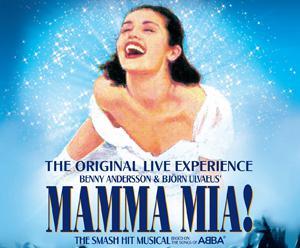When I decided to finally go and see Mamma Mia, I tried to shake off all my preconceptions about this show and just enjoy it. I reminded myself that it’s the original jukebox musical, and it’s a little unfair to hate it just because it spurred a decade of underwhelming musical theater that continues to stifle originality on both sides of the Atlantic.
 I can’t deny that it’s good fun. Who doesn’t love ABBA? That’s the whole premise behind the jukebox musical. The tagline on the Mamma Mia tube posters at the moment is – I kid you not – “you already know you’re going to love it”. With an audience preconditioned to love you, you can’t really go wrong!
I can’t deny that it’s good fun. Who doesn’t love ABBA? That’s the whole premise behind the jukebox musical. The tagline on the Mamma Mia tube posters at the moment is – I kid you not – “you already know you’re going to love it”. With an audience preconditioned to love you, you can’t really go wrong!Some credit has to be given to Judy Craymer, who conceived the whole idea, for creating a storyline that fits in most of the songs. But no matter how enjoyable the songs may be, the fundamental flaw with jukebox musicals is the difference between a concert and musical theatre. A good concert is a series of good songs. But a musical needs more than this: each and every song must add to the story. You can still have group dance numbers and big ballads, but ultimately each and every song furthers the narrative in some way.
A good writer can achieve this with a couple of the songs in a jukebox musical, but overall the majority of them can achieve only that whimsical satisfaction you get when you hear a song you like at a concert, and not the level of emotional connection and storyline momentum that a musical needs to be anything more than bubblegum. Mamma Mia is full of songs that were written to make you smile for three minutes, and only a handful actually do anything for the plot.

The singing and dancing is very, very good, but the producers take absolutely no risks (why can’t Donna be alone on an empty stage for the end of The Winner Takes it All?). And at the end of the day what little interesting character development there has been, is mostly thrown away for a happy ending; Donna, a woman who has shown herself to be proudly single and genuinely happy, is still a shrew to be tamed by a man with a ring.
If you already know you’re going to love Mamma Mia, then you probably will. If you need something with a bit of originality, substance or flair in order to get your money’s worth from a night at the theatre, then pick something else.

